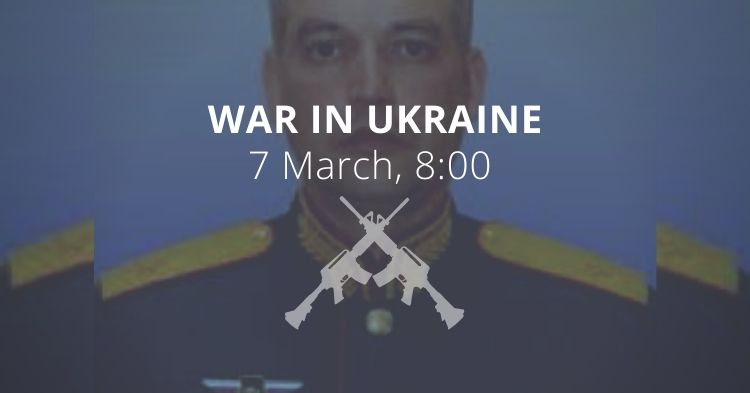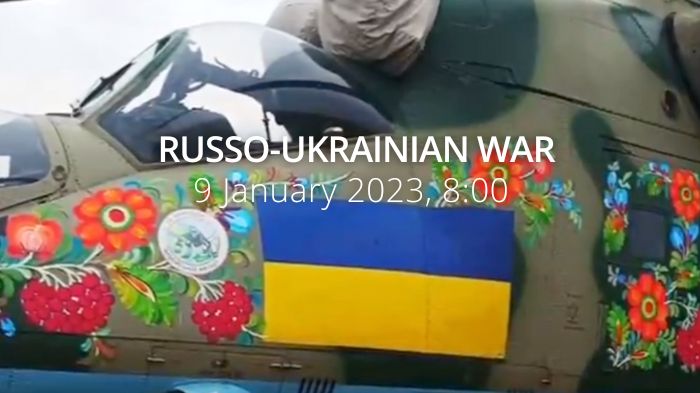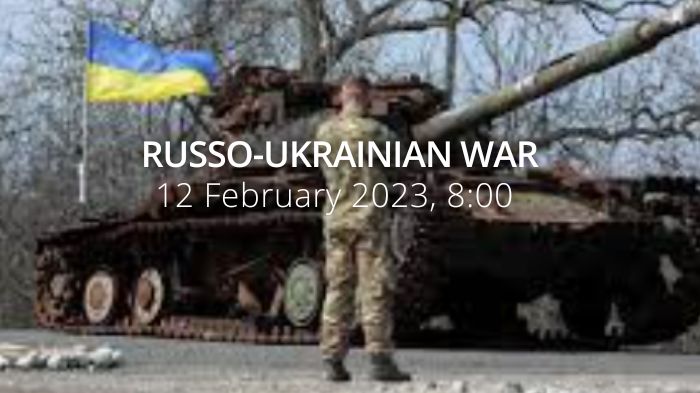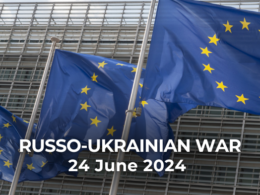Morning report day 13 - March 8
The report is based on media reports, expert analyses and official information posted online.
BTG: Battalion Tactical Group, approximately 600–800 officers and soldiers, of whom roughly 200 are infantrymen, typically equipped with roughly 10 tanks and 40 infantry fighting vehicles.
Situation
According to information from the General Staff of Ukraine as of Operational information on 06.00, 07.03.2022 and [midnight]:
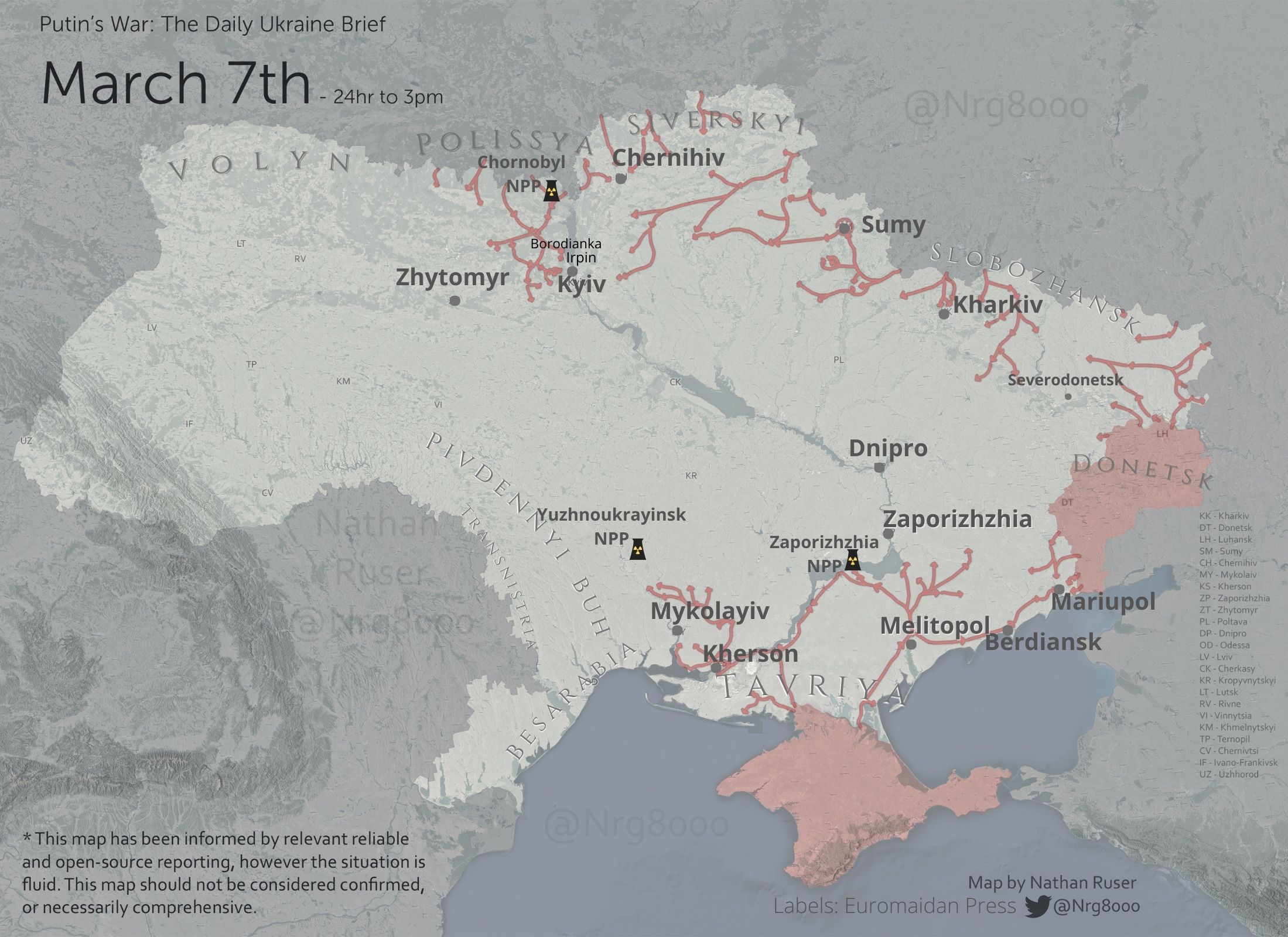
The enemy continues the offensive, but the pace of advance of his troops has slowed significantly.
[The enemy continues the offensive operation against Ukraine with the support of aircraft and missile strikes, focusing its main efforts on the following tasks: providing a land corridor between the [Temporarily Occupied Territories (parts of Donbas)] TOT of the Autonomous Republic of Crimea and the mainland of the Russian Federation; taking full control of the city of Mariupol; encirclement with further capture of the city of Kyiv, as well as access to the administrative borders of Luhansk and Donetsk regions.]
The [Ukrainian] Defence Forces continue to conduct a defense operation within the Southern, Eastern, and Northern Operational Zones along defined boundaries.
The Kyiv City Defence Forces continue to defend the capital along the outer border of the defense and in additionally defined areas.
[During the day, the enemy regrouped to organize the storming of Kyiv. The occupiers plan to join the assault by the most capable units and subdivisions of the Ramzan Kadyrov Special Guards Regiment (Grozny), the 27th Detachment of the Kuzbass (Kemerovo), the 604th Vityaz Center (Moscow) of the Rosguard and the private military company Liga (formerly Wagner).]
[In the Polissya direction, the enemy concentrated in the settlements of Poliske, Kukhari, Borodyanka, Byshiv, Byshiv, Horenychi, Demydiv.]
[In the direction of settlement Byshiv the enemy was maneuvering with forces up to two BTGs from the 36th All-Army of the RF Armed Forces and is trying to move forward.]
[In the direction of settlement Tarasivshchyna, Rakivka the enemy from the 98th Airborne Division in cooperation with BTGr of 155 separate Marine Brigade after forcing the Irpin River near Rakivka launched an offensive, but suffered significant losses in manpower and equipment, lost part of the offensive potential and stopped.]
[In the Siverskyi direction, the enemy is conducting an offensive operation with the help of units from 2, 41 all-military armies of the RF Armed Forces and the 90th Tank Division of the Central Military District in order to block Chernihiv and prepare for the attack on Sumy.]
The heroic defence of the city of Chernihiv continues in the Siversky direction.
[In the Slobozhansk direction, the enemy forces of the 1st Tank Army of the RF Armed Forces (up to 12 BTGr), the 20th All-Military Army of the RF Armed Forces (up to 8 BTGr), the 6th All-Military Army (up to 2 BTGr) of the Western Military District, and the 14th Army Corps focuses on the directions of Kaniv, Novomoskovsk. Stopped and trying to resume the offensive on Sievierodonetsk by the 144th Motorized Rifle Division of the 20th All-Army of the Russian Armed Forces. Carries out regrouping and preparation for the storming of the city of Sumy.]
[When trying to master settlement Izium the enemy suffered losses and retreated. The occupiers terrorized the city, shelling civilian homes and infrastructure.]
[In the Donetsk direction, the enemy with forces of up to 7 BTGr 1, 2 Army Corps, and 150 motorized infantry division of the 8th General Army continues offensive operations in the direction of the Dnipro and Zaporizhzhia in order to reach the administrative borders of Donetsk Oblast.]
[In order to conduct offensive operations in the direction of Sievierodonetsk, the BTGr of the 150th Motorized Rifle Division is being moved. Attempts to break through the defense in the Volnovakha direction.]
[It is trying to break through the defense of Mariupol but to no avail.]
[On the Tavriya direction the enemy by the forces of separate units of separate divisions of the 49th general army of the Armed Forces of the Russian federation, 22 army corps, 20 motorized infantry divisions of the 8th general army of the Armed Forces of the Russian Federation and Airborne Troops in the following directions; to Voznesensk
- up to 3 BTGr from the 49th General Army of the RF Armed Forces; in Zaporizhzhia - up to 4 BTGr of the 42nd Motorized Rifle Division and 136 separate motorized infantry brigades of the 58th All-Military Army of the RF Armed Forces; Melitopol, Mariupol - up to 3 BTGr from the 19th Motorized Rifle Division of the 58th General Army. Carries out regrouping of troops for offensive operations.]
In the Southern operational zone, the defensive operation along the state border is carried out and the sea coast is covered, defensive fights in suburbs of Mykolayiv are conducted.
[In the Pivdennyi Buh operational area the enemy is stopped on approaches to Mykolayiv, carries out a regrouping of troops for resumption of the offensive.]
[During the fighting near Kharkiv, the Chief of Staff, First Deputy Commander of the 41st General Army, Major General Vitaliy Gerasimov, was killed, and several senior officers of the Army Staff were killed and wounded.]
Ukraine's military intelligence has reported that during the fighting near Kharkiv, Russian Maj. Gen. Vitaly Gerasimov, Executive Officer and 1st Deputy Commander of the 41st Army of the Central Military District of Russia, was killed. pic.twitter.com/gVEUGIw8Ua
— Euromaidan Press (@EuromaidanPress) March 8, 2022
[We protect our Ukrainian land! Ukraine is the shield of Europe! Victory will be ours! Glory to Ukraine!]
In other areas, the stabilization operation is underway and territorial defense tasks are operating in the designated operational zone.
The Air Force of the Armed Forces of Ukraine successfully repulses missile and airstrikes and means of air attack of the enemy, air cover of critical objects of Ukraine, and groups of troops.
The occupiers are demoralized and increasingly looting and violating the rules of international humanitarian law on military conflict. [In general, the moral and psychological state of the enemy is low. It is demoralized due to heavy losses in manpower and military equipment, in some areas it is deserting.]”
Black Sea
According to Black Sea News, as of 00:00 (Kyiv time) on 7 March 2022, there are 13 Russian warships and 5 support vessels of the four fleets of the Russian Federation in the Mediterranean Sea. Türkiye has told Russia not to send the ships through the Bosporus strait. Earlier, Reuters reported that at least four Russian ships - two destroyers, a frigate, and a reconnaissance vessel - were waiting for Türkiye's decision to move from the Mediterranean to the Black Sea.
Since the beginning of 2022, the Russian Federation has relocated 20 warships from the Mediterranean to the Black Sea, including 14 ships of the Black Sea Fleet, as well as 6 (3 each) from the Northern and Baltic Fleets.
Wilhelmsen Ships Service (WSS) has introduced a new Ukraine-Russia Port Situation Map on the Ships Agency section of its website. Color coding on the map immediately identifies which locations do not allow for port calls (red), those which allow for port calls with conditions/restrictions (dark blue), and those which are open as usual (light blue). Users are able to click on each port or country on the map to view the latest port restrictions and updates. The map is being updated up to two times per day, informs WSS, with a last updated timestamp to be found in the map’s legend information box.
Repressive actions of the occupiers
The “Financial Times” with reference to European intelligence services and officials reports that Russian authorities have instructed the FSB to prepare punitive operations in the captured Ukrainian cities to break the resistance of the population, UACrisis reports. According to representatives of European intelligence, the Russian FSB was instructed to maintain political order in the captured cities:
“Russian officials are considering aggressive measures to quell possible protests and resistance, including violent crowd control, repressive detentions of protest organizers, and possibly public executions to deter Ukrainian protesters.”
Launch of national roaming
Monday, the mobile operators Kyivstar, Vodafone Ukraine and lifecell together with the Ministry of Digital Transformation of Ukraine, the State Service for Special Communications and Information Protection of Ukraine, the National Commission for State Regulation in the Fields of Electronic Communications, Radio Frequency Spectrum and Provision of Postal Services together with the Ukrainian Association of Telecom Operators "Telas" announce the launch of national roaming in Ukraine.
"This means that subscribers can switch to the network of other operators if it is not possible to use the signal of their mobile operator," Interfax reports. This will enable Ukrainians to remain connected.
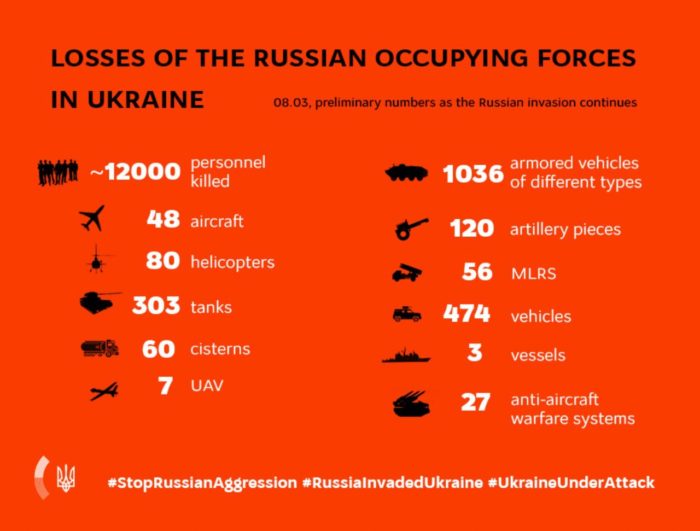
As of 08.03.2022 morning, the approximate losses of weapons and military equipment of the enemy of the Russian Armed Forces from the beginning of the war to the present day:
- personnel – more than 12.000 people (+1000),
- tanks – 303 units (+13),
- armoured combat vehicles – 1036 units (+37),
- artillery systems – 120 (+3),
- multiple rocket launchers – 56 (+6),
- air defence means – 27 (+4),
- aircraft - 48 (+2),
- helicopters - 80 (+12);
- automotive technology – 474 (+20),
- light speedboats - 2 units (no change),
- fuel and lubricant tanks – 60 (no change),
- UAV operational and tactical level – 7 (no change).
Humanitarian
Ms. Russell from UNICEF reported that the past eight years of conflict had already inflicted profound and lasting harm on the 7.5 million children in Ukraine, and threats have only grown with the current crisis. Since the fighting began, at least 27 boys and girls have been killed, and 42 have been injured. UNICEF expects child casualty numbers, as well as displacement, to increase. Half of the refugees are children. Meanwhile, homes, schools, orphanages, and hospitals have all come under attack, while water and sanitation facilities, and other civilian infrastructure, have been hit, affecting millions. “What is happening to children in Ukraine is a moral outrage,” said Ms. Russell.
in Ukraine, targeted attacks on civilians, ineffective humanitarian corridors and spiralling risks, briefers and delegates alike called for decisive action to end the conflict, as the Security Council held its seventh meeting in two weeks related to the unfolding situation. “Simply put, millions of lives have been shattered,” said Martin Griffiths, Under-Secretary-General for Humanitarian Affairs and Emergency Relief Coordinator.
Indeed, the reach of humanitarian efforts can only go so far without the committed cooperation of Ukraine and the Russian Federation to ensure civilian protection and the maintenance of safe corridors for people wanting to escape the violence and those delivering critical aid. Some civilians are unable to escape at a time when 1.7 million have already fled the country since the conflict began on 24 February, while those who remain are facing cuts of essential services. Voicing an extra sense of dread over the impact the conflict will have on the wider world, he expressed deep worry about the consequences on vulnerable people living half a world away, with food prices spiking and supplies uncertain.
The Polish government passed a draft bill to create an 8 billion zloty ($1.75 billion) fund to help war refugees from Ukraine, Reuters reports. More than 1 million have crossed the border into Poland. Many thousands have been hosted across the country, but the aid effort has been predominantly shouldered by non-governmental organizations, volunteers, and municipalities.
https://twitter.com/EuromaidanPress/status/1500829973942317068
According to Ukrainska Pravda the situation in the regions are as follows:
- Kyiv Oblast. Fights in Irpin. Shelling in Makarov, Gostomel district. The movement of enemy vehicles in the north of Brovary district. Constant alarm of air strikes on Vasilkov, Bila Tserkva, Gostomel, Uzin. The region is preparing for evacuation.
- Kirovohrad region. The area is quiet.
- Volyn. The night was calm.
- Kherson. At two o'clock in the morning, powerful explosions were heard. The consequences are being clarified.
- Zhytomyr Oblast. The night was calm. In the evening - an air raid. Strike at two oil depots and an industrial zone.
- Zaporizhzhia region. Situation in the region: the enemy is preparing to attack Zaporizhzhia, regrouping troops.
In the occupied settlements of Polohy, Vasyliva, Tokmak, Melitopol, Berdiansk, and Energodar, the situation is controlled by community leaders. At the same time, the enemy is trying to establish a police regime through overt terror aimed at civilians.
- Rivne Oblast. The night was quiet.
- Vinnychyna. Night passed peacefully.
- Khmelnytsky Oblast. Attempts to fire on Starokostiantyniv. The attack was repulsed..
- Ternopil. The night was calm.
- Cherkasy. The night passed without worries in the region.
- Lviv region. The night was quiet.
- Chernihiv Oblast. Several air alarms at night. Defensive battles near Chernihiv, in the oblast.
- Sumy. Aviation raid on residential areas of the city, in the private sector. More than 20 dead and wounded, including children.
- Sumy Oblast - also air strikes on villages, on usual houses. The number of victims is being clarified.
- Okhtyrka - night air raid, bombed residential neighborhoods, private sector, grocery stores. They hit the already broken CHP plant again. City 4th day without heat completely. The number of victims is being clarified, the SES is dismantling the blockages.
- Poltava Oblast. In the evening - air alarms in Lubny and Poltava. At night - quiet.
- Chernivtsi. There was an air alarm in Chernivtsi in the evening. The night passed quietly.
- Ivano-Frankivsk. The night passed calmly.
- Luhansk. Shelling of Popasna , Rubizhne and Sievierodonetsk. In Popasna, 2 people were killed in a psychoneurological dispensary. In Rubizhne - 3 wounded civilians. There is no gas supply, partly electricity and water.
- Donetsk. Mangush, the last town before Mariupol - under Russian control. On March 8, a connection with Mariupol briefly broke through. The situation in the city is difficult. They are very much looking forward to humanitarian aid. Volnovakha has already been destroyed. The evacuation from there will continue on March 8. In the area of Avdiivka shelling. The battle began in the area of Marinka in the morning
- Odesa. The night was calm.
- Mykolaiv Oblast. Yesterday repulsed from the city from occupiers. Explosions were heard at night. Everything was quiet in the area at night.
- Dnipro. In Dnipropetrovsk Oblast the night passed without worries.
- Kharkiv. Kharkiv is relatively calm at night. Fighting took place in the region in the Izium and Dergachiv directions.
- Zakarpattia. The night was calm.
Legal
The United States is collecting evidence of possible war crimes, human rights abuses and violations of international law by Russia during its ongoing invasion of Ukraine, a National Security Council spokesperson told NBC News on Monday.
The International Criminal Court has now launched an investigation into actions in Ukraine at the request of 39 countries. This is an important step in the global condemnation of the Russian invasion, The Conversation report. Individual states, the European Union and the African Union have been lining up to condemn Russian President Vladimir Putin. [ ] Some experts have highlighted the difficulties of using international law to condemn Russia, and the investigation will examine the actions of all parties involved in the conflict. But the ICC does have the ability to charge Putin with war crimes if it finds evidence he has committed them. However, it is extremely difficult to prove intent to commit war crimes. So difficult, that only six people have been convicted by the ICC and served sentences.
According to the General Staff of Ukraine:
- Thus, in Kharkiv, Sumy, Chernihiv and Kyiv oblasts, in the territories temporarily occupied by the Russian occupiers there are the facts of robberies, acts of violence against local residents, seizure of civilian housing, use of agricultural hangars for parking military equipment, setting up firing positions in the area of civil infrastructure facilities are widely recorded.
- In the territories which are temporarily occupied by the enemy in Kherson and Mykolayiv oblasts, after February 24, 2022, the occupiers use units of psychological operations to influence the local population. According to the available information, up to 10 tactical groups of psychological operations with tasks related to conducting propaganda work with the local population have been created.
- The occupiers are intimidating the population of the northern part of the temporarily occupied territory of the Autonomous Republic of Crimea with the offensive of the Armed Forces of Ukraine. In addition, the Federal Security Service of the Russian Federation is setting up task forces there to work with the population, in particular, to identify resistance.
Environmental
The head of the World Food Programme, David Beasley, has warned the conflict in Ukraine could send global food prices soaring, with a catastrophic impact on the world's poorest. Ukraine and Russia are both major exporters of basic foodstuffs, and the war has already hit crop production, driving up prices
Russia and Ukraine, once dubbed "the breadbasket of Europe", export about a quarter of the world's wheat and half of its sunflower products, like seeds and oil. Ukraine also sells a lot of corn globally. Analysts have warned that war could impact the production of grains and even double global wheat prices.
Mr. Beasley told BBC World Service's Business Daily program that the number of people facing potential starvation worldwide had already risen from 80 million to 276 million in four years prior to Russia's invasion, due to what he calls a "perfect storm" of conflict, climate change and coronavirus. He said certain countries could be particularly affected by the current crisis, due to the high proportion of grains they currently import from the Black Sea region.”
Support
UK MPs are set to pass a new law aimed at toughening sanctions on Russia over its invasion of Ukraine, EuroNew
s report. Prime Minister Boris Johnson said the Economic Crime Bill will let British authorities root out money linked to Russian President Vladimir Putin.
“Hungary allows NATO troops to be deployed in western Hungary and weapons shipments to cross its territory to other NATO member states, according to a decree signed by Prime Minister Viktor Orban,” Reuters reports. “The decree, however, says Hungary does not allow lethal weapons shipments across its territory to Ukraine.”
This marks a continuation of Hungary’s policy of undermining Ukraine. In May 2014, right after the annexation of Crimea, Orbán demanded autonomy for Hungarians in Transcarpathia (a territory of Ukraine that belonged to the Austro-Hungarian monarchy until the end of the first World War). It has been blocking ministerial-level political meetings between NATO and Ukraine, and its efforts to join the transatlantic community. Until the Russian attack on February 24, Prime Minister Orbán has been a vocal critic of sanctions and is one of Putin’s strongest allies within the EU.
New developments
According to the Centre for Defence Strategies:
- Ukraine president Volodymyr Zelensky will address the Commons today via video link and is expected to plead for more arms and a no-fly zone over Ukraine to be enforced by NATO.
- The Prime Minister of India addressed the President of the Russian Federation, calling for direct negotiations with the President of Ukraine. India continues to maintain a balance between Moscow and Washington despite the active efforts of the Biden Administration to get New Delhi involved in imposing sanctions against the Russian Federation.
- United we stand, divided we fall. According to Visegrad Post,
“Brussels and Paris, instead of coming to the aid of the frontline countries and urgently releasing funds for them, they are still busy imposing financial sanctions on Poland and Hungary. On 3 and 4 March, the EU-27 European Affairs ministers had a meeting in Arles, France under the French presidency of the EU Council to discuss, according to the program disclosed on 2 March and posted online by Polish MEP Jacek Saryusz-Wolski, the effectiveness of the existing tools for enforcing the “rule of law”. Article 7 sanction procedures against Poland and Hungary, which France would very much like to reactivate, were also on the agenda.”
- OSCE Special Monitoring Mission to Ukraine (SMM) has completed its evacuation of international mission members from the Mission’s area of operations. The SMM has suspended its reporting activities. Its mandate expires 31 March 2022. Since a mandate extension requires the consent of all OSCE member states, including Russia, a suspension of the mission is a likely outcome.
As previously stated, the evacuation of SMM means that the international community loses both situational awareness on the ground and an important resource to counter the false narratives that the Kremlin uses to justify its aggressions, hide its atrocities and blame Ukraine.
Assessments
The Institute for the Study of War assessment as of Monday 22:00 (Kyiv time):
- Main effort—Kyiv (comprised of three subordinate supporting efforts);
- Supporting effort 1—Kharkiv;
- Supporting effort 1a—Luhansk Oblast;
- Supporting effort 2—Mariupol; and
- Supporting effort 3—Kherson and advances westward.
Russian forces are concentrating in the eastern, northwestern, and western outskirts of Kyiv for an assault on the capital in the coming 24-96 hours. The Russians are bringing up supplies and reinforcements as well as conducting artillery, air, and missile attacks to weaken defenses and intimidate defenders in advance of such an assault.
It is too soon to gauge the likely effectiveness of any Russian attempt to complete the encirclement of Kyiv or to seize the city at this time. If Russian troops have been able to resupply, reorganize, and plan deliberate and coordinated simultaneous operations along the several axes of advance around and into the capital, they may be more successful in this operation than they have in previous undertakings. Operations near Kyiv in the past 72 hours have not offered enough evidence to evaluate that likelihood.
Russian troops in southern Ukraine continue to divide their efforts between attacks westward toward Mykolayiv and Odesa, attacks northward toward Zaporizhzhia, and attacks eastward toward Mariupol and Donbas. Failure to focus on any single line of advance has likely hindered Russian operations and will probably continue to do so.
Russian troops in Kherson Oblast appear to be feeling their way around Mykolayiv, likely seeking to find a route across the Pivdennyi Buh River that would allow them to bypass Mykolayiv itself and resume their advance on Odesa. Those heading toward Zaporizhzhia currently lack the combat power likely necessary to encircle or take that large city. They could, however, set conditions for successful operations against Zaporizhzhia once reinforcements arrive following the fall of Mariupol and the opening of a wide land route westward from Donbas.
Key Takeaways
- Russian forces are consolidating and preparing for further operations along the western and eastern outskirts of Kyiv, especially in the Irpin area on the west and the Brovary area on the east;
- Ukrainian forces are challenging the extended Russian lines reaching from Sumy, which Russian forces have not yet taken, to the eastern outskirts of Kyiv;
- Russian troops are likely attempting to bypass Mykolayiv and cross the Pivdennyi Buh upriver of that city to permit an advance on Odesa that will combine with an impending amphibious operation against that city; and
- Russian forces are driving north from Crimea toward the city of Zaporizhzhia.”
In the article “Western weakness is enabling Russian war crimes in Ukraine,” Bohdan Klid, the director of Research at the University of Alberta’s Holodomor Research and Education Consortium (Canadian Institute of Ukrainian Studies), wrote that
“In light of [ ] setbacks, Russia has switched to terror tactics and is increasingly focusing on missile strikes, aerial bombing, and the indiscriminate shelling of civilian targets. Civilian casualties are now mounting at an alarming rate, with major cities including Kharkiv and Mariupol in ruins.”
“So far, the Western response to Putin’s invasion has proved insufficient to restrain Russia. Sanctions imposed since the beginning of the war have been unexpectedly severe, but they have stopped some way short of the most extreme options available. The UK has been reluctant to match its rhetoric with tough steps against Russian oligarchs, for example, while Germany has blocked efforts to impose potentially game-changing sanctions on Russian energy exports.
These half-measures have sent a dangerous message to the Kremlin that the West remains unwilling to engage in full-scale economic warfare. The results of this folly can be seen in the escalating bombardment of Ukraine’s cities.
Ukraine has long called on the West to engage with Russia from a position of strength, while also warning of the threat to international security posed by the Putin regime. Alarm bells first rang in 2008 when Russia invaded Georgia. It is now painfully clear that the weak Western response to that brief war was a grave mistake.
In spring 2014, the democratic world was equally feckless in its reaction to the Russian seizure of Crimea and military intervention in eastern Ukraine. Western leaders initially subjected Moscow to relatively modest economic sanctions and only agreed to tighten restrictions when Russia shot down a passenger airliner over the east Ukrainian combat zone in July 2014.
While European leaders condemned Putin’s 2014 attack on Ukraine, they did not hesitate to forge stronger economic ties with Russia. This hypocritical stance was epitomized by Germany’s decision to partner with Russia on the construction of a major new gas pipeline, which was announced in 2015 despite Russia’s refusal to end the occupation of Crimea and eastern Ukraine’s Donbas region. German politicians would continue to defend their collaboration with the Kremlin until Putin’s recent invasion finally forced Berlin to cancel the pipeline.
This weakness is all the more inexcusable as Putin has never made any secret of his intention to subjugate Ukraine.”
The deliberate bombardment of cities and targeting of civilians is a war crime. The last Nuremberg prosecutor still alive, Benjamin Ferencz, recently called for Russia to be held accountable.
“The crimes now being committed against Ukraine by Russia are a disgrace to human society. Those responsible should be held accountable for aggression, crimes against humanity and plain murder,” Ferencz stated in a social media post. “The sooner they start dragging the criminals before a court, the happier we will be. When will the world’s democracies finally demonstrate their determination to make Russia answer for its crimes?”
No further comments are needed. When will the world’s democracies finally demonstrate their determination?

